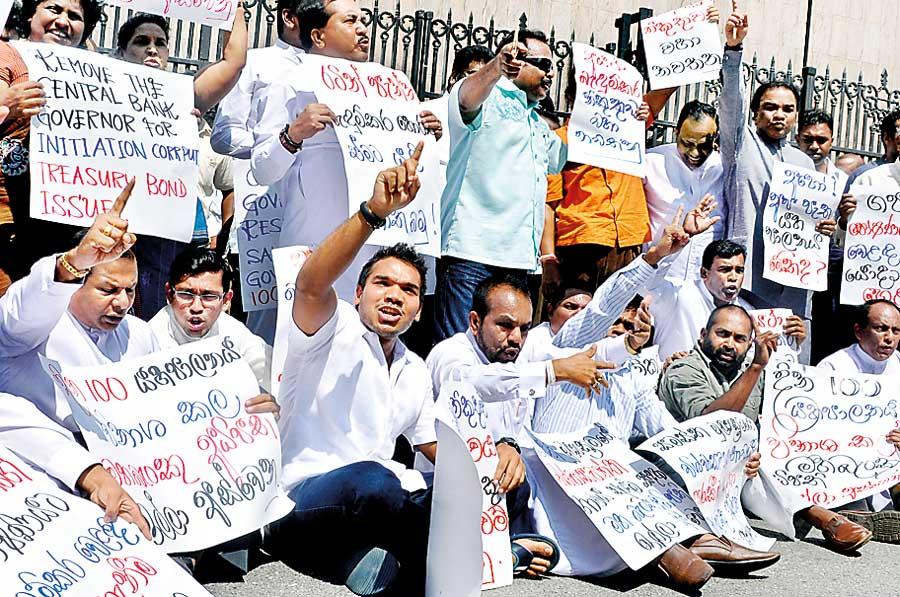Reply To:
Name - Reply Comment

Opposition politicians questioning the government’s commitment to good governance during a protest over the Central Bank bond scandal
With national security being touted as the most pressing issue in the upcoming presidential election campaign, good governance, an equally important issue, has virtually become a non-issue.
The lack of concern for good governance is unfortunate and raises a question as to whether Sri Lankans are really interested in good governance and if so what percentage of the population is concerned about it.
At the last presidential election five years ago, in areas outside the north and east, a majority of the people voted for Mahinda Rajapaksa, despite his regime’s poor good governance  record. So, good governance was not the concern of some 47.58 percent of voters. In contrast, in the north and east where the minority combination of Tamil and Muslim communities makes a majority, most people voted against Rajapaksa because they perceived his regime as anti-minorities. Good governance was not their main concern. Their votes – more than 25 percent of the total vote -- gave the joint opposition candidate, Maithripala Sirisena, a head start over Rajapaksa. With Muslim and Tamil votes in his bag, Sirisena wanted only about 25 percent of the Sinhala vote. This he managed to get from the hardcore UNP Sinhalese and also from the educated Sinhala swing voters who wanted to see good governance in politics.
record. So, good governance was not the concern of some 47.58 percent of voters. In contrast, in the north and east where the minority combination of Tamil and Muslim communities makes a majority, most people voted against Rajapaksa because they perceived his regime as anti-minorities. Good governance was not their main concern. Their votes – more than 25 percent of the total vote -- gave the joint opposition candidate, Maithripala Sirisena, a head start over Rajapaksa. With Muslim and Tamil votes in his bag, Sirisena wanted only about 25 percent of the Sinhala vote. This he managed to get from the hardcore UNP Sinhalese and also from the educated Sinhala swing voters who wanted to see good governance in politics.
This basic psephological analysis indicates that only a small percentage of the total voters voted for good governance or yahapalanaya at the 2015 election, but their votes enabled Sirisena to fill the shortfall and win the poll. However, the good governance slogan stuck with the Maithripala Sirisena-Ranil Wickremesinghe administration in the early days of their coalition government. Later, the slogan became the butt of political jokes. Mekada Yahapalanaya? Iduwa Nallatchi? Is this good governance? People began to question as the government failed to fulfil most of its promises and itself faced corruption allegations, the main among them being the central bank bond scam.
"Good governance (Yahapalanaya in Sinhala or Nallatchi in Tamil) is not a topic for politicians to laugh about or make a joke of it. Good governance is not a political charade to win votes. The Sirisena-Wickremesinghe alliance is accused of doing this in 2015"
Corruption allegations apart, to be fair by Prime Minister Wickremesinghe’s administration, one must admit that it has, to a great degree, strengthened democratic institutions by adopting the 19th Amendment and ensured, to a great extent, the independence of the judiciary. The Right to Information Act is one of its few good governance feats. On media freedom, it gave an overdose of it; so much so certain media groups and journalists began publishing fake news with impunity and twisting and turning news to suit their political agendas. Also, even the present government’s harshest critics admit that no person has been abducted or has gone missing for speaking out against the government.
To assess a government’s good governance record, we need to understand what good governance actually is. Good governance has become a catchy phrase in political discourses and development literature around the world. The United Nations has become its chief proponent, while the European Union, the Commonwealth and other multilateral world bodies have made it a priority issue and a vital condition in dispensing development aid.
According to a UN document, good governance has eight major characteristics. It is participatory, consensus-oriented, accountable, transparent, responsive, effective and efficient, equitable and inclusive and follows the rule of law. It assures that corruption is minimised, the views of minorities are taken into account and that the voices of the most vulnerable in society are heard in decision-making.
In other words, good governance is about democracy, human rights, accountability, transparency, law and order and the independence of the judiciary.
Although the Wickremesinghe administration may have fallen short in many of these good governance aspects, the little it has brought about can become a foundation for us to reach the peak of good governance. This can be achieved only if the next president is committed to good governance. Even national security, which we have made a priority presidential campaign issue, can be assured better in a good governance setup than in a strongman setup.
On good governance, certainly the present government’s score is much higher than that of the previous government.
However, it is a matter of great concern that of late, especially since the April 21 terror attacks, whatever little good governance we had has taken a beating with regard to the implementation of the rule of law. Good governance requires fair legal frameworks that are enforced impartially. When laws are selectively applied and the police act with partiality, there is no good governance. A case in point is the misuse of or the selective use of the ICCPR (International Covenant on Civil and Political Rights) Act by the law enforcement authorities.
Good governance, a check against corruption and abuse of power, is not only the responsibility of government and state institutions. People also should become stakeholders of good governance. The media, trade unions and other pressure groups which are part of civil society should also become advocates of good governance, instead of becoming lackeys of a politician or a political party.
"On good governance, certainly the present government’s score is much higher than that of the previous government"
Obviously, the opposite of good governance is bad governance symbolised by corruption, money laundering, thuggery, violence, civil strife, injustice, nepotism, absence of democracy, lack of human rights and suppression of minorities. Therefore, as political parties gear up for the presidential election, we the people as responsible members of civil society must extract a pledge from all candidates that they will adhere to good governance principles if they are elected to office as the servants of the people.
Good governance (Yahapalanaya in Sinhala or Nallatchi in Tamil) is not a topic for politicians to laugh about or make a joke of it. Good governance is not a political charade to win votes. The Sirisena-Wickremesinghe alliance is accused of doing this in 2015. The Ven. Sobhitha Thera, who was championing good governance, died a disappointed monk after he felt his vision was being scaled down by the Sirisena-Wickremesinghe government. Similarly, during the 1977 general election campaign, the then opposition the United National Party pledged to set up a Dharmishta or just government. But once in office, its governance became anything but Dharmishta. The March 12, 2015 declaration that Sri Lanka’s political leaders signed, giving an undertaking that they would adhere to clean politics, was about good governance and ending corruption. Sadly, only a few remember that they have signed such a document.
Good governance is a serious topic; the candidates should spell out in their manifestos the measures they will take to establish good governance in Sri Lanka’s political culture.